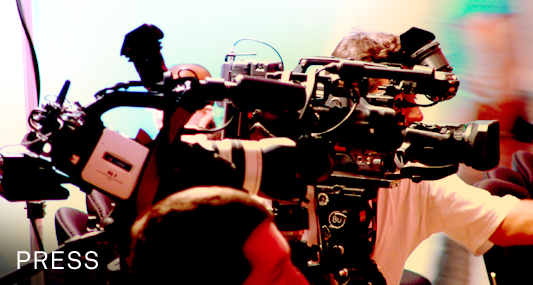
CHI 2011 Conference Preview
"As technology pervades our environments and our lives, computer-human interaction professionals are empowered with the ability to use technology to understand and enhance the human condition like never before. The upcoming Computer-Human Interaction (CHI 2011) conference offers an extensive program of innovative ideas in research and practice that blazes new paths toward a brave new world,” notes Dr. Desney S. Tan, CHI 2011 General Conference Chair and Senior Researcher at Microsoft Research.
Tan's research and experience in human-computer interaction have given him first-hand knowledge of how ideas born at this conference have culminated in useful, usable technologies that transform our lives. This year’s event is scheduled May 7-12 at the Vancouver Convention Centre in British Columbia, Canada. Join us at CHI 2011 in Vancouver and prepare yourself for connecting... and interacting with the future of technology.
Quick Links
- Glimpse of the Future
- Social Networking
- Improving Health
- Persuasive Health Systems
- Entertainment
- Teens and Technology
- Connecting Children and Families Through Technology
- Sustainability
- Technology in Developing Regions
- Plenary Speakers
- Interactivity (Interactive Demonstrations and Performances)
- Key Contributor Recognition Awards
- Courses
- Professional Networking/Job Fair
- Conference Sponsors
- About ACM
- About SIGCHI
- Contact Information
About the CHI Conference
Originally a small conference for psychologists interested in user interface design, the annual CHI conference has grown to include a very diverse participant group (such as interaction designers, computer scientists, engineering psychologists, developers, performing artists, and more), and to deal with larger problems such as the organizational integration of technology. This year’s conference marks 29 years of research, innovation and development in the field of Human-Computer Interaction and is expected to draw more than 2500 professionals from over 40 countries. CHI 2011 offers provocative opportunities for connecting and interacting with future technologies.
Featuring over 800 works, the CHI conference is the premier worldwide forum for the exchange of information on all aspects of human-computer interaction. Typically the works presented address the concerns of the design, engineering, management and user experience professionals. This year's conference also features works that focus on: child-computer interaction; entertainment; health and sustainability. Works are presented in several different venues: preconference workshops and the doctoral consortium are scheduled first. The main conference includes panel discussions, courses that provide leading-edge HCI knowledge, paper sessions, case studies, works-in-progress, student design and research competitions, interactive demonstrations, special interest groups, and a Tuesday evening video night (popcorn included).
Also of interest are special presentations on future technologies for improving the quality of life through social networking and other emerging areas of global concern. The following areas represent a small portion of the total conference. For complete information about this year’s conference, consult the Advance Program.
Glimpse of the Future
Paper on Your Noise is My Command: Sensing Gestures Using the Body as an Antenna
Paper on CueT: Human-Guided Fast and Accurate Network Alarm Triage
Paper on Mid-air Pan-and-Zoom on Wall-sized Displays
Paper on A Professional Multi-touch Tool for Constructing Virtual Organic Environments
Paper on Privacy Risks Emerging from the Adoption of Innocuous Wearable Sensors in the Mobile Environment
Paper on Exploring Camera Viewpoint Control Models for a Multi-Tasking Setting in Teleoperation
Paper on Pinstripe: Eyes-free Continuous Input on Interactive Clothing
Paper on MicroManderin: Mobile Language Learning in Context
Paper on RoboShop: Multi-layered Sketching Interface for Robot Housework Assignment and Management
Case Study on: The Shape of Simon: Creative Design of a Humanoid Robot Shell
Social Networking
Opening keynote speaker Howard Rheingold's presentation on Social Networking
Closing keynote speaker Ethan Zuckerman's closing presentation on Social Networking
Paper on Dealing with Death in Designing and Developing Systems for the Bereaved
Paper on "Voluntweeters": Self-Organizing by Digital Volunteers in Times of Crisis
Paper on Life Modes in Social Media
Paper on Social Capital on Facebook: Differentiating Uses and Users
Paper on Social Media Ownership: Using Twitter as a Window onto Current Attitudes and Beliefs
Case Study on Leading Change with Collaborative Design Workshops
Paper on Design Lessons from the Fastest Q&A Site in the West
Improving Health
Panel on Facebook for Health: Opportunities and Challenges for Driving Behavioral Change
Panel on Re-engineering Health Care with Information Technology
Paper on Patient-Friendly "Micro-explanations" of Medical Events
Paper on Exploring the Potential for Touchless Interaction in Image-Guided Interventional Radiology
Paper on Motivating Mobility: Designing for Lived Motivation in Stroke Rehabilitation
Paper on Promoting Empathy Towards Aphasia Through Language Distortion Emulation Software
Paper on Cueing for Drooling in Parkinson's Disease
Paper on Competing Online Viewpoints and Models of Chronic Illness
Paper on Opportunities for Computing Technologies to Support Healthy Sleep Behaviors
Presentation on Happiness Counter: Smile-Encouraging Appliance to Increase Positive Mood
Special interest group session on Interactive Technologies for Health
Paper on Reflecting on Pills and Phone Use: Supporting Awareness of Functional Abilities for Older Adults
Persuasive Health Systems
Paper on Mining Behavioral Economics to Design Persuasive Technology for Healthy Choices
Paper on Means Based Adaptive Persuasive Systems
Paper on Fit4Life: The Design of a Persuasive Technology Promoting Healthy Behavior and Ideal Weight
Paper on Designing for Peer Involvement in Weight Management
Entertainment
Panel of distinguished scholars will consider The World of Warcraft as a Global Artifact
Paper on Introverted Elves & Conscientious Gnomes: The Expression of Personality in World of Warcraft
Paper on An Exploratory Study of Input Modalities for Mobile Devices Used with Museum Exhibits
Paper on Guess Who? Enriching the Social Graph through a Crowdsourcing Game
Paper on Love, Hate, Arousal and Engagement: Exploring Audience Responses to Performing Arts
Paper on Buzzing to Play: Lessons Learned From an In the Wild Study of Real-time Vibrotactile Feedback
Paper on Designing Sports: A Framework for Exertion Games
Special interest group on Digital Arts and Interaction
Teens and Technology
Paper on Social and Technical Challenges in Parenting Teens' Social Media Use
Paper on Exploring Evaluations of a Computer Game Supporting Cognitive Behavioral Therapy for Adolescents
Paper on In the Mood: Engaged Teenagers in Psychotherapy Using Mobile Phones
Paper on Teenagers and Their Virtual Possessions: Design Opportunities and Issues
Paper on Homeless Young People and Living with Personal Digital Artifacts
Connecting Children and Families Through Technology
Panel on The Future of Child-Computer Interaction
Paper on Infrastructures for Low-cost Laptop Use in Mexican Schools
Paper on Hello, is Grandma There? Let's Read! StoryVisit: Family Video Chat and Connected E-Books
Paper on Family Portals: Connecting Families Through A Multifamily Media Space
Sustainability
Case study on Flo: Raising Family Awareness about Electricity Use
Paper on Practices in the Creative Reuse of e-Waste
Paper on Ceci N'est Pas Une Pipe Bombe: Authoring Urban Landscapes with Air Quality Sensors
Note on A Phenomenology of Human-Electricity Relations
Technology in Developing Regions
Paper on A Design Model for Women's Empowerment in the Developing World
Paper on Designing an E-Solution for Linking Informal Self-Help Groups in Africa.
Paper on Designing for Emerging Rural Users: Experiences from China
Paper on The Times They Are A-Changin': Mobile Payments in India
Transaction on CHI Designing Mobile Interfaces for Novice and Low-Literacy Users
Plenary Speakers
CHI 2011 opening speaker, Howard Rheingold, an acknowledged authority on mobile communications discusses the evolution and future of social media in teaching and learning. Rheingold, the author of Smart Mobs, innovator, and Stanford University lecturer, notes, the "use of social media in higher education teaching sessions can provide opportunities for innovative and meaningful interactions that extend far beyond the traditional face-to-face classroom experience."

Also addressing the conference is Harvard University's Ethan Zuckerman on how social media tools have enabled people around the world to influence world views. The democratization of publishing makes it possible to encounter news and perspectives from far beyond our national borders, Zuckerman notes, But it also encourages us to pay attention to what friends find interesting and compelling, which often reinforces our existing prejudices and preconceptions.

Interactivity (Interactive Demonstrations and Performances)
Interactivity is a highly visible program that features 24 hands-on demonstrations and interactive performances. These interactive exhibitions developed by leading researchers will be on display at CHI 2011. The first group of demonstrations opens on Monday evening; the second is available on Tuesday. Three performances are integrated into the conference. A few of this year features include:
Coco - The Therapy Robot
Touch and Copy, Touch and Paste
Mouseless - a Computer Mouse as Small as Invisible
Blinky Blocks: A Physical Ensemble Programming Platform
humanaquarium: Exploring Audience, Participation, and Interaction
Snaplet: Using Body Shape to Inform Function in Mobile Flexible Display Devices
Key Contributor Recognition Awards
Larry Tesler, of Tesler Consulting, will be recognized with the SIGCHI Lifetime Practice Award for his outstanding interface design work.
Alan Newell, of the University of Dundee, will be recognized with the SIGCHI Social Impact Award for his prescient view on interaction design and older adults.
Clayton Lewis, of University of Colorado, will be recognized with the SIGCHI Social Impact Award for his early understanding of the value of interaction with technology from multiple directions.
Terry Winograd, of Stanford University, will be recognized with a Lifetime Research Award for expanding the dimensions of humanness in the field of human-computer interaction (HCI).
Arnie Lund, of Microsoft Research, will be recognized with the SIGCHI Lifetime Service Award
Jim Miller, of Miramontes Interactive, will be recognized with the SIGCHI Lifetime Service Award.
Stuart Card, of Xerox Palo Alto Research Center (PARC), one of the fathers of the field of Human-Computer Interaction, will be honored for his lifelong contributions to the field.
Join SIGCHI Lifetime Achievement recipient, Bill Buxton, as he presents An Informal Walk through 35 years of Collecting the History of Interactive Devices.
Courses
In addition to the technical presentations, CHI 2011 offers a diverse series of 32 full and half-day courses. These courses range from basic classes, such as Human-Computer Interaction: Introduction and Overview to narrowly focused advanced topics, such as New Methods for Designing for and with the iChild: Strategies for Today's Mobile, Social, and Internet Technologies. Other examples of the wide range of offerings include Inspiring Mobile Interaction Design and Understanding Users in Context: Fieldwork in User-Centered Design.
Professional Networking/Job Fair
Valued equally with the technical sessions and courses are the informal conversations that help form a community of Human-Computer Interaction (HCI) professionals. Many attendees return each year because the relationships formed with other members of the community are as important as technical sessions. Conference attendees can spend their days encountering unexpected new ideas and taking advantage of formal and informal networking opportunities to discuss them. Of special interest is the Tuesday night, (coming soon), a scheduled time for interested participants to explore employment opportunities.
Conference Sponsors
Organizations contributing to the financial support of the conference include Champion Sponsors Bloomberg; eBay; Google, Inc.; Microsoft Corp.; SAP and the National Science Foundation (NSF). Contributing Sponsors include Autodesk, EventBurn, GRAND, Nokia and IBM Research. See a complete list of the CHI 2011 sponsors.
About ACM
ACM, the Association for Computing Machinery, www.acm.org, is the world’s largest educational and scientific computing society, uniting computing educators, researchers and professionals to inspire dialogue, share resources and address the field’s challenges. ACM strengthens the computing profession’s collective voice through strong leadership, promotion of the highest standards, and recognition of technical excellence. ACM supports the professional growth of its members by providing opportunities for life-long learning, career development, and professional networking.
About SIGCHI
CHI 2011 is sponsored by the ACM Special Interest Group on Computer Human Interaction (SIGCHI). The ACM Special Interest Group on Computer-Human Interaction,
Contact Information
Rosemary W. Stevens
CHI 2011 Publicity Coordinator
Ace Public Relations, Palo Alto
+1 650 494 2800
